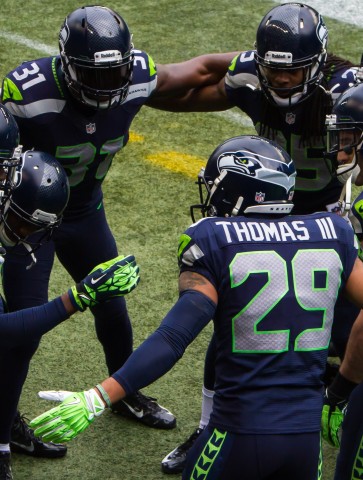The overriding narrative of the Seahawks' season-opening loss in St. Louis is thus: Dion Bailey is the goat, and the Seahawks need to pay their holdout GOAT, Kam Chancellor, before the season slips away.
Wonderful overreaction.
Bailey, the safety replacing Chancellor in the starting lineup, is being blasted for his very obvious part in the defensive meltdown during the 34-31 overtime loss to the Rams: Falling down and letting Lance Kendricks score the tying touchdown with a minute left.
So many people think Chancellor's presence would have prevented that play and a Seattle loss, but they are all forgetting something: The Hawks were burned by tight ends almost all of last season, giving up 11 touchdowns (third most in the league). FYI: That was with Chancellor.
The Seattle defense's biggest weakness has always been in the short area of the field, where teams with quick passers and good receiving backs and tight ends can carve them up. Last season, San Diego, Dallas, Kansas City and New England (in the Super Bowl) beat the Hawks with that strategy. Denver, Carolina, Oakland and Green Bay all nearly beat them using it.
So, it was no surprise Sunday that Nick Foles completed 11 passes to running back Benny Cunningham (four for 77 yards) and tight ends Kendricks (two for 42) and Jared Cook (five for 85).
Linebackers K.J. Wright and Bobby Wagner had made tons of big plays all preseason, and Wright had spoken of his renewed focus on stopping tight ends, but for most of Sunday they were seen chasing Cunningham, Tavon Austin and the tight ends after big gains.
The Seahawks lamented missed tackles and big passing plays (seven of more than 20 yards), and Cliff Avril said, “It felt like we gave up the most explosive plays that we’ve given up since I’ve been here."
Sure, Bailey and Cary Williams were part of the problem, but Earl Thomas' lack of practice time with the new players was a major factor as well. The communication did not seem to be there as receivers ran free through the short zones of the Seattle defense -- and then broke clear for bigger gains.
Most of Thomas' team-high nine tackles were made far down the field. He was more focused on the status of his surgically repaired shoulder: "I was just happy with the outcome with how my shoulder held up,” said Thomas, who did contribute one of three forced fumbles.
Meanwhile, the Seahawks altered their nickel defense, putting DeShawn Shead at left cornerback and moving Richard Sherman to the slot. Sherman was victimized by a perfectly thrown 22-yard pass to Stedman Bailey in overtime, a play that helped set up the Rams' go-ahead field goal.
“We just tried to mix it up a little bit today,” Sherman said. “We mixed up some coverages. We gave us some good players, gave us some good opportunities, and it worked out, for the most part.”
But, obviously, not everything worked out. The Hawks gave up far too many plays in the passing game, and Bailey's face-plant was just the most notable.
“It’s just something that just can’t happen,” Bailey said. “I was just too flat-footed. My foot stuck in the turf when I tried to open up. At that point I’ve got to tackle him. Just tackle him (take the penalty) and live to fight another day.
“I’ve got to go 100 percent on my opportunities, and I missed a big one today. I’ve got to learn from it and represent my family name better next week.”
The Seahawks are not likely to panic after one game and relent in their dealings with Chancellor, whom they already have offered an extra $3 million next year. They apparently are just $900,000 short of his request, and teammates have asked John Schneider to accommodate him so they can get him back.
But that apparently is not going to happen, as owner Paul Allen has told Schneider to cease talks with Chancellor's agent, Alvin Keels.
In the meantime, perhaps people will realize Chancellor's replacement wasn't the only member of the defense who failed to stop the Rams.
Image: Mike Morris (Flickr)
